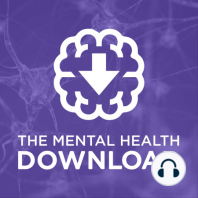27 min listen

Mary Burchett & Mike Brose on How Businesses Can Prioritize Mental Health
FromMental Health Download: Exploring Mental Illness, Suicide, Homelessness and Incarceration
Mary Burchett & Mike Brose on How Businesses Can Prioritize Mental Health
FromMental Health Download: Exploring Mental Illness, Suicide, Homelessness and Incarceration
ratings:
Length:
19 minutes
Released:
May 15, 2020
Format:
Podcast episode
Description
Listen to this discussion between Mary Burchett, of Bank of America, and Mike Brose, CEO of Mental Health Association Oklahoma. Together they discuss how businesses can prioritize mental health.
Check out this Journal Record piece by Mary Burchett that's available now at: https://journalrecord.com/2020/05/15/qa-how-businesses-can-prioritize-mental-health/
Q&A: How businesses can prioritize mental health
By: Mary Burchett Journal Record Guest Columnist May 15, 2020
As Oklahomans continue to show strength during the coronavirus pandemic, the physical, financial and emotional strains we all are experiencing are converging. Many employers are taking steps to protect the health and safety of employees, including their mental and emotional well-being.
As part of Bank of America’s $100 million global coronavirus community relief effort, the bank provided Mental Health Association Oklahoma with funding to support increased local demand for their services. With May being National Mental Health Awareness Month, I spoke to Mike Brose, CEO of MHAO, to discuss how businesses can keep employees and our broader community healthy – physically and emotionally.
Burchett: How can a business prioritize mental wellness for its employees?
Brose: We encourage employers to offer Employee Assistance Programs as part of their employee benefits. EAPs can provide support through telemedicine. For employers who already offer them, now is the time to communicate with your employees about the benefits and services they receive. If your employer doesn’t offer an EAP, you can call our Mental Health Assistance Center at 918-585-1213 or 405-943-3700.
Burchett: What is your best mental health tip for those who are working from home during this time?
Brose: Be mindful of how you are feeling and take regular breaks. Too much self-isolation is a recipe for the slow deterioration of self. Care for others from your own home – call, text, video chat – it shows you care and follows one of our long-standing tenets: it’s better to give than to receive.
Burchett: What about essential workers who need to work on-site?
Brose: We recommend some practices that are universal to mental health, including getting enough rest, minimizing alcohol use, and engaging in at-home exercise. For front-line workers, quality personal protective equipment also gives peace of mind. The first step to taking care of those around you is to take care of yourself.
Burchett: How is MHAO meeting the increase in demand?
Brose: Social distancing means we are unable to offer in-person support groups, so we took them online. MHAO established groups for different roles, including first responders, essential workers and even groups for the general public. You can find information about these groups at mhaok.org/supportgroups.
To hear more from my conversation with Mike, listen to the Mental Health Download podcast at mhaok.org/podcast or via your favorite podcast app.
Mary Burchett is Tulsa market manager for Bank of America and a Mental Health Association Oklahoma board member.
Check out this Journal Record piece by Mary Burchett that's available now at: https://journalrecord.com/2020/05/15/qa-how-businesses-can-prioritize-mental-health/
Q&A: How businesses can prioritize mental health
By: Mary Burchett Journal Record Guest Columnist May 15, 2020
As Oklahomans continue to show strength during the coronavirus pandemic, the physical, financial and emotional strains we all are experiencing are converging. Many employers are taking steps to protect the health and safety of employees, including their mental and emotional well-being.
As part of Bank of America’s $100 million global coronavirus community relief effort, the bank provided Mental Health Association Oklahoma with funding to support increased local demand for their services. With May being National Mental Health Awareness Month, I spoke to Mike Brose, CEO of MHAO, to discuss how businesses can keep employees and our broader community healthy – physically and emotionally.
Burchett: How can a business prioritize mental wellness for its employees?
Brose: We encourage employers to offer Employee Assistance Programs as part of their employee benefits. EAPs can provide support through telemedicine. For employers who already offer them, now is the time to communicate with your employees about the benefits and services they receive. If your employer doesn’t offer an EAP, you can call our Mental Health Assistance Center at 918-585-1213 or 405-943-3700.
Burchett: What is your best mental health tip for those who are working from home during this time?
Brose: Be mindful of how you are feeling and take regular breaks. Too much self-isolation is a recipe for the slow deterioration of self. Care for others from your own home – call, text, video chat – it shows you care and follows one of our long-standing tenets: it’s better to give than to receive.
Burchett: What about essential workers who need to work on-site?
Brose: We recommend some practices that are universal to mental health, including getting enough rest, minimizing alcohol use, and engaging in at-home exercise. For front-line workers, quality personal protective equipment also gives peace of mind. The first step to taking care of those around you is to take care of yourself.
Burchett: How is MHAO meeting the increase in demand?
Brose: Social distancing means we are unable to offer in-person support groups, so we took them online. MHAO established groups for different roles, including first responders, essential workers and even groups for the general public. You can find information about these groups at mhaok.org/supportgroups.
To hear more from my conversation with Mike, listen to the Mental Health Download podcast at mhaok.org/podcast or via your favorite podcast app.
Mary Burchett is Tulsa market manager for Bank of America and a Mental Health Association Oklahoma board member.
Released:
May 15, 2020
Format:
Podcast episode
Titles in the series (100)
Review of Oklahoma's 2019 Legislative Session by Mental Health Download: Exploring Mental Illness, Suicide, Homelessness and Incarceration